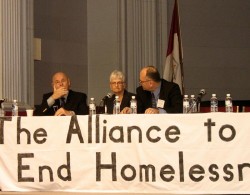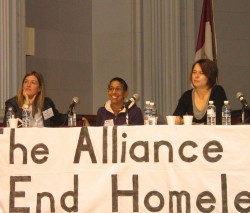
Somehow the Mayor and I ended up at the same community forum today. I stayed all day, while he just made an appearance. Too bad: there was much he could have learned, since homelessness is one of his more conspicuous areas of ignorance.
The Mayor said some nice things about the work of the Alliance to End Homelessness, and beseeched and implored them to continue to “do God’s work.” Then he issued a Proclamation declaring November 22nd to be National Housing Day here in Ottawa. Then he left.
This, don’t forget, is the same mayor who likened homeless people to pigeons and cancelled the crack kit program.
This is what the mayor missed:
The morning consisted of two panel sessions: one on research, one on youth. Many interesting things were said, but the optimal length for a blog post is apparently 500 words. [insert ruthless chopping noises here]
Dr. Stephen Hwang, an epidemiologist in Toronto and an expert on homelessness and health, said that homelessness is a symptom of a more systemic disease in society. The penalty for being at the bottom of the hierarchy is extreme, with numerous deprivations culminating in homelessness. He also cautioned people to be careful about oversimplifying complex research into sound-bytes, which sparked an interesting discussion about just that.
Janna Dickinson, an Ottawa panhandler and youth advocate/activist, said that prostitution, addiction and homelessness have been around for centuries – we can’t eliminate them, but we can reduce the harm they cause. She also noted that in a city as huge as Ottawa, it sucks that so few people care enough about homelessness to show up and talk about it (there were about 200 people there).
Another young woman from the streets – Stephanie (I couldn’t take my eyes off her ears – she had the biggest holes in her earlobes I’ve ever seen, and they hung halfway to her shoulders) – made a good point about being hassled by cops on the streets. “Being homeless isn’t wrong,” she said, “It’s just unfortunate.”
There was a lunchtime breakout session, where people could choose which of eight groups to attend. Tough choice, but I ended up in the Health and Harm Reduction group. There were about 20 of us there – outreach workers, nurses, shelter staff, sex trade workers, social workers, police, students, etc.
First things first: a trip around the table where everybody introduces themselves.
Mandy: “Hi, I’m Mandy, I’m a sex trade worker, and I’m just here to get information.”
Alain: “I’m Alain, I’m with the Ottawa Police Services, and same for me.”
Mandy: “You’re a sex trade worker too?”
Mandy was funny. And interesting. And a crack addict. And apparently quite happy with that lifestyle. As one of the street youth pointed out, not everybody needs to be saved.
And this, I think, is one of the things I learned today. I haven’t fully clarified it in my own mind, but basically, it’s that we all need to be less judgemental and more tolerant of other people’s circumstances and choices. We might not always understand those choices, but we can still accept them. (I can’t understand why anybody would become a dentist, for that matter, but I still accept their right to do so.)
Addiction is a cyclical thing. Some addicts are happy and have no desire for change. They might reach a point later where they’re not getting what they want or need from the drugs anymore, or when the cons outweigh the pros, and they might then need help extricating themselves from the addiction. That help ought to be available to them. (It’s not, in Ottawa; we don’t have a treatment centre.)
Some people don’t want help, but some do.
April is a sex trade worker because she cannot survive on $500 a month from welfare. “It gets more degrading as time goes on,” she says. And she pointed out that the help stops too soon. “People will help you to the middle,” she said, “but they won’t help you to the end.”
Almost everybody who spoke today who was homeless or addicted or formerly homeless or addicted, mentioned low self esteem, and its role in shaping their lives. And just about every single one of them prefaced their remarks with “I can’t speak for anybody else,” which I thought was indicative of them knowing and respecting their differences. Most people refer to “the homeless” as if they were an homogenous group. Homeless people don’t do that.
There was some question of whether drug addiction is increasing. Many people in the room thought it was, based on their own experience working with people on the streets. However one person questioned this, and cautioned us not to assume it to be true. He suggested that perhaps drug use is just more visible now than it used to be. And he gave some interesting examples of how that could be. For instance, fear of crime could be leading more people to build fences to keep people out of their yards and laneways. This would in turn result in more visible drug use since there are fewer relatively private places available to them. And this of course would have a snowball effect.
I’m very interested in this question of whether drug use is increasing. There are groups with a vested interest in exaggerating the problem, which could lead to more punitive measures against drug users (both vigilante and through the criminal justice system). The current backlash against drug users in Ottawa worries me. Solutions need to be based on realities, not on misperceptions, hysteria or outrage. However, I do respect the anecdotal observations of front-line workers who say they see an increase in drug use. I’d still like to see some research.
 Much of the day’s focus was on harm reduction programs, such as the cancelled crack kit program. Four people who work at Insite – the safe injection site in Vancouver’s Downtown East Side – gave a presentation in the afternoon. Insite provides a variety of health services to some of the most difficult to house people in Vancouver: people with complicated combinations of chronic problems. And 76% of Vancouverites support this program!
Much of the day’s focus was on harm reduction programs, such as the cancelled crack kit program. Four people who work at Insite – the safe injection site in Vancouver’s Downtown East Side – gave a presentation in the afternoon. Insite provides a variety of health services to some of the most difficult to house people in Vancouver: people with complicated combinations of chronic problems. And 76% of Vancouverites support this program!
The Insite representatives were all so articulate and well-informed and interesting. They shared a rare ability to weave anecdotal and scientific evidence together in the most interesting and informative of ways.
I’ve exceeded my 500 word target, so I will stop. Abruptly. But first, you’re all invited to the Eternal Flame at Parliament Hill on Monday the 26th at noon. Insite has something special planned; it sounds like fun. I hope to see you there.
Tags
















sorry zoom, I’m not sure what you do. were you attending in an official capacity or as a concerned citizen?
homelessness must be incredibly difficult in a climate such as canada’s. do you have cases of people dying of exposure during the colder months?
I attended with both hats on, nursemyra – personal and professional. (Personally I’m just interested in these issues. Professionally, I was asked to go and identify potential speakers and workshop leaders for a conference we’re planning.)
And you’re right about the climate being one of the deadlier challenges to homeless people here. People do literally freeze to death on our streets.
[…] November the Alliance puts on an absolutely first-rate one-day conference about homelessness in Ottawa. This conference is free and open to everybody […]
[…] is my third year attending and blogging about this event (see 2007and 2008). I like it because it’s free. Actually, that’s an over-simplification. Because […]